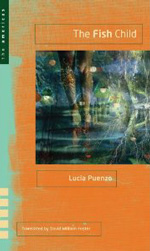

Texas Tech University, hardcover, 9780896727144
The most interesting aspect of this book is not that it is a romantic tale of two teenage girls who are lovers struggling to stay together despite huge class and wealth differences. Nor is it the choice of the family dog, Serafín, as a narrator for the events. What makes The Fish Child interesting is that the use of Serafín as an external observer allows us to see that class and circumstance so affect our world that a single set of events can translate into two very distinct stories.
Guayi, the 17 year old maid, is the lover of 16 year old Lala, the daughter of a wealthy and famous author. Lala's debauched and depressive father, Brontë, her absentee mother, and her drug addicted brother occupy very little of her attentions; she is obsessed with a romantic plan to run away with Guayi and live on the shores of Paraguay's Lake Ypacaraí in Guayi's village. In order to acquire the money for their plan, Lala steals art and jewelry from her family's home and sells it. When things go wrong at home, the police become involved and things fall apart as Lala and Guayi attempt to put their plan into effect.
The novel opens with the adoption of Serafín, who immediately takes on the narration of most of the story. Granting him a fluent understanding of human speech, Puenzo is able to use his shifting vantage point to present us perceptions of each of the characters, both alone and in their interactions. Serafín provides a perspective that, if not disinterested, is still external to those of both girls. It allows us to observe that the events, though jointly experienced, end up forming two very different stories. On the surface Lala and Guayi seem to share a vision of life: they are in love and they will run away and live happily ever after. However, this surface similarity covers a vast divide, one that Lala does not perceive at all and that Guayi only half-recognizes.
For Guayi, the world is viewed in terms of survival. There is a pragmatic and often harsh sense of reality and what one must do to survive in it. When Brontë requests her in his bed, though she doesn't like it, she simply acquiesces. To do otherwise would be to risk dismissal and a return to abject poverty. As the events of the book turn more grim, Guayi's motivations are grounded in necessity, even to the point where the reader wonders how much is love and how much calculation.
In contrast, Lala sees the entire world with a sort of naíveté that fits everything into its place as part of a grand tale. That same event that Guayi accepted resignedly requires epic response, not to avenge the nonconsensual aspects (which Lala may not even perceive) nor out of jealousy, but because it outrages the tale of her life. Once the lover is rescued through a daring and unnecessary gamble—who will fall, the heroine or the villain?—the story is repaired and their life can continue with no backward glances.
The thin, romantic shell of the story becomes a setting that showcases how wealth and privilege allow Lala to afford her world view, a luxury that class and circumstances do not permit to Guayi. The result is somewhat scathing in its assessment of the Argentinean privileged, particularly the persistent nature of their unwillingness to see. Emblematic of this is the legend that lends the book its title, of a young boy who lives at the bottom of Lake Ypacaraí to guide drowning souls. Lala believes this story is real, never guessing that beyond the fable lies a darker reality, and what that might say about Guayi's history.
Puenzo's treatment of the theme of inequity is neither heavy-handed nor disparagingly shallow. She manages to fashion twin story lines that resolve with the two visions largely intact, both Lala's fiction and Guayi's reality. In doing so, she leaves behind a stark picture of a society out of touch with itself.
The Fish Child (El Niño Pez) was Argentinean author Lucía Puenzo's first novel, written in 2004 and newly-available
in an English translation. The latter follows on the heels of the film version of the book which was adapted
and directed by the author, and released in 2009.
